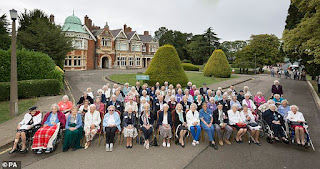Dear Harry,
This morning, aside from the usual online exchanges, I sent out an email to my old friend Ben. Do you remember him? It has been nearly two years since I last heard from him. He still lives in the north of England where he has spent most of his life. We were school chums at the age of seven or eight. He was the one friend I could always rely on, steady, unfazed by the cruelty or hostility of other boys. I no longer recall how it was that we reconnected just a few years back when we were both already grandfathers, but we met up at a pub somewhere in Hertfordshire, near where my son Matthew lives with his family and took a stroll together down a country lane, re-establishing our long, deep connection while the others in our party were starting on their before-dinner drinks in the lounge.
Ben’s family lived in a large stone house perched on a hillside at the edge of Lake Windermere, and I stayed there with them once for a few days when I was about ten years old. I remember a dreadful and for me unusually acute attack of homesickness as I stood by the window of my cold little attic room, looking out over the gray lake, at dusk perhaps, and feeling, despite my welcome, terribly alone.
The next day I went with Ben down to the boathouse where they kept a small sailing dinghy and headed out onto the lake. Ben knew how to sail. What he did not know, could not have known because these strange weather conditions happen without warning, was that a squall was approaching us rapidly from the head of the lake. Before we knew it, the fierce gale attacked us with incredible force and bitter, driving rain. Never having experienced such a thing in my life before, I was terrified. Ben struggled to unfurl the sail while the little boat bucked and reared and twisted underneath us, threatening to sink below the sudden, angry waves. Stalwart as ever, he saw to it that we weathered out the storm and, after it had passed, rowed the dinghy back to the safety of the boat house.
This was the first time I had been in mortal anger. I was afraid, but not of death I think. Does any child so young have any real concept of death? Unless, I suppose, they have seen death take someone close to them.
Ben and I had lost touch already by the age of twelve, when we each went off to different boarding schools for the remainder of our school days. I learned that he had joined the ministry and had devoted his life, as you had done, to a parish priesthood. I’m sure he was the ultimate “good shepherd.” Long retired by the time we met again as old men, he had found a retirement passion as a beekeeper, tending to his bees with the same meticulous care, I’m sure, as he had tended to his flocks.
I wonder about bees. I wonder about their instinctive connectedness, as busy tribes zooming in and out of their hive, flying out in all directions—according, perhaps, to some unknowable plan—in search of nectar and returning to the hive to make their tiny, necessary contribution to the common weal.
And the queen, I wonder? Is she a benevolent but demanding monarch, a ruler of all those who occupy her domain? Or is she their servant, subject to the common will
I must ask Ben about this if I get the chance. I also want to talk to him about God. I want to ask him if he still believes, if belief is difficult for him. I want to share with him my disbelief, and yet an ancient, deep-felt longing for something to believe in.
Your son, Peter






